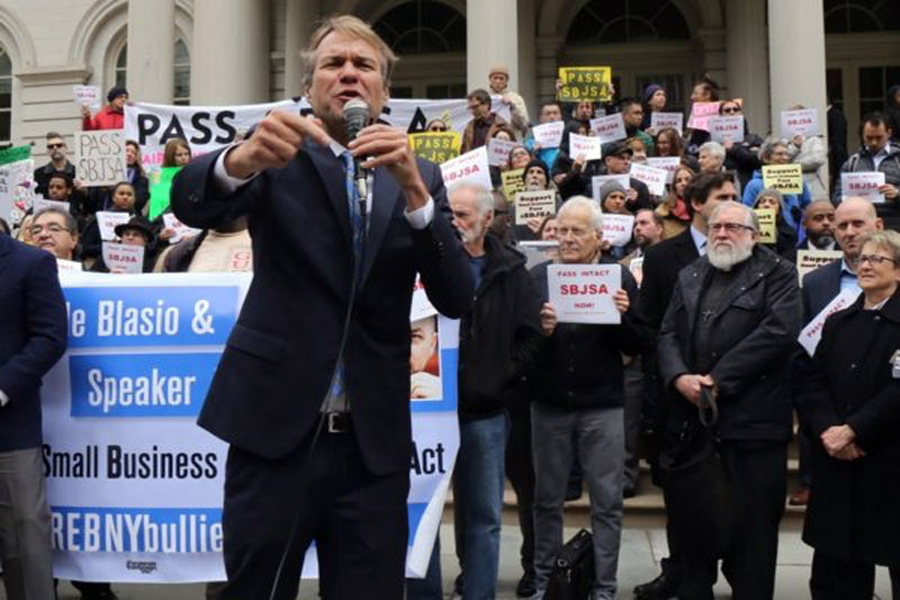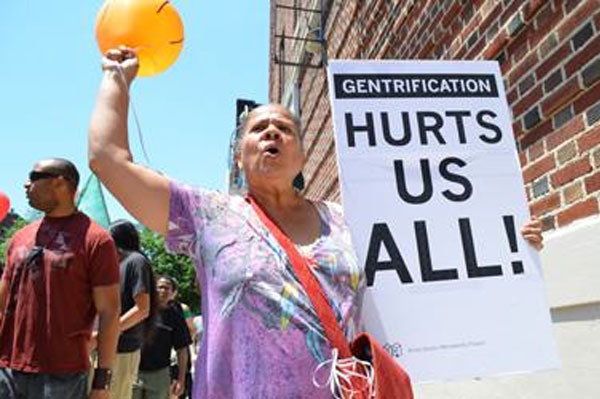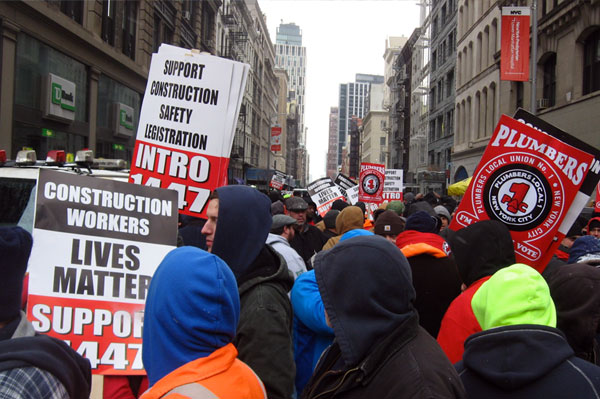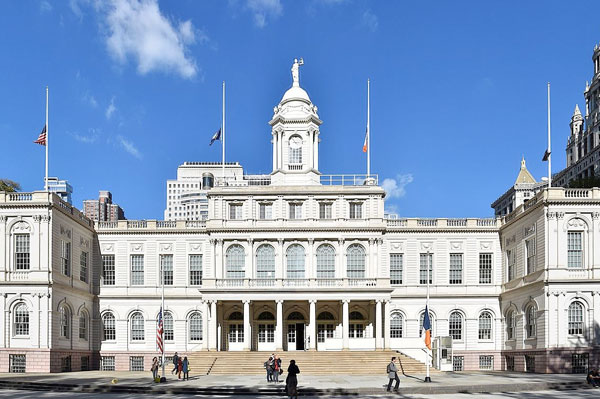Small Biz Survival Bill finally gets its hearing
By Lincoln Anderson | October 25, 2018 | The Villager | Read Original

Before the hearing, David Eisenbach, of Friends of S.B.J.S.A., led a rally outside City Hall in support of passing the bill.
Photos by Tequila Minsky
More than 200 people packed a hotly anticipated hearing on the Small Business Jobs Survival Act at City Hall Monday. Scores of people signed up to testify on the issue, and the hearing turned into a marathon, lasting more than eight hours.
Among some of the main takeaways were that it became clear the de Blasio administration does not support the S.B.J.S.A., and that, according to City Council Speaker Corey Johnson and others, the bill should not be O.K.'d as is, and needs some modifications.
The hearing also saw a testy exchange between Johnson and John Banks, president of the powerful Real Estate Board of New York, which has long been accused of working behind the scenes to keep the bill from ever coming up for a vote.
Banks said the bill would "stifle" economic activity and deprive property owners of their rights. REBNY, among others, is expected to sue if the Council passes the bill and it is not vetoed by de Blasio.
Former Manhattan Borough President Ruth Messinger was on hand to testify in support of the legislation — currently known as Intro. 737A — which she originally introduced when she was an Upper West Side city councilmember.
Advocates for the act in the audience frequently would silently flutter their hands over their heads — a permitted form of displaying support — at statements backing the bill or small merchants. Council security staff quickly greeted any applause or cheering with rebukes not to interrupt the hearing.
Meanwhile, about 50 representatives of business improvement districts a.k.a. BIDs and others against the bill sat in the audience wearing blue baseball caps sporting the slogan "Vote No on Commercial Rent Control" on their fronts. The group also included commercial real estate brokers and representatives of residential co-ops and condos.
The S.B.J.S.A. has languished in the City Council for three decades. The measure would address what advocates say is the biggest hurdle facing mom-and-pop shops — the lease-renewal process. When leases expire, landlords, especially in gentrified Manhattan, typically jack up the rents to levels that current tenants can no longer afford.
Seventy-five business improvement districts, or BIDs, across the city oppose the bill. Their members were among a group of about 50 people wearing blue "No Commercial Rent Control" caps at the hearing.
However, for a merchant with an expiring lease, the S.B.J.S.A. would mandate mediation with the landlord and then, if needed, binding arbitration to reach agreement on a 10-year lease renewal.
Shortly after being elected the Council's speaker earlier this year, Johnson pledged that he would hold a hearing on the long-snubbed bill. Yet, at the same time, he warned that the S.B.J.S.A. was "not a silver bullet," in his opinion, and that an array of other strategies would also be needed to help small businesses survive.
Despite suffering from a bad chest cold — that sometimes saw him loudly coughing on the dais — Johnson sat through about four-and-a-half hours of Monday's hearing, which was chaired by Mark Gjonaj, head of the Council's Small Business Committee.
Johnson said small merchants provide essential services and products, mentioning "bodegas, laundromats, shoe-repair shops... ."
"When a longtime business is shuttered, we lose a piece of New York," Johnson said.
Small businesses help make New York more livable in many ways, he noted, from providing essential services, like shoe repairs, to holding packages and mail for residential neighbors.
"I don't have a doorman," Johnson said. "I don't need one. I have a deli right at my corner at 15th St. and Seventh Ave."
At the same time, he said, "Advocates aren't going to like this — I don't think this bill is a perfect bill. ... This is a complicated issue."
He and other councilmembers also warned of potential "unintended consequences" of the S.B.J.S.A.
Former Borough President Ruth Messinger introduced the first version of the S.B.J.S.A. around 30 years ago when she was a city councilmember.
Gregg Bishop, the commissioner of the city's Department of Small Business Services, made it clear that the de Blasio administration has issues with the S.B.J.S.A. Bishop said that because landlords often have more resources than their tenants, the arbitration process would not be fair. He also wondered if New York would have "enough arbitrators" to handle all the lease-renewal cases.
But Assemblymember Richard Gottfried, in his testimony later on, said the situation already is unfair toward the tenants and could not possibly be worsened by the S.B.J.S.A.
State Senator Brad Hoylman held out his report, "Bleaker on Bleecker," which detailed the crisis of empty storefronts on the famed Village strip.
Johnson and others took issue with the fact that the bill would cover all commercial tenants in New York City — includeing not just ground-floor storefronts, but upper floors occupied by financial firms and white-shoe law firms.
As one speaker put it, "shopping malls" would even be covered by the S.B.J.S.A.
At the same time, Johnson repeatedly grilled Bishop on what the city plans to do about the problem of merchants' rents "doubling, tripling, quadrupling and quintupling."
Johnson repeatedly brought up the example of Tortilla Flats, the long-running and beloved far West Village bar and restaurant, that sadly is closing on Sat., Oct. 27, due to high rent.
"It just came out in the last two days that they are closing," Johnson said. "Clayworks pottery was forced out of its spot in the East Village after 44 years," he said, referring to another store that closed a year ago due to an unaffordable rent.
John Banks, president of the Real Estate Board of New York, said that the S.B.J.S.A. would "stifle" economic activity.
"The Associated Supermarket on 14th St. and Eighth Ave., one of the last affordable supermarkets in the Village — they tripled their rent, and that store is still empty," Johnson said.
It was also noted that McNally Jackson, the independent bookstore on Prince St. in the Little Italy area, is being forced to leave its space.
The city's retail landscape is at risk of being homogenized, Johnson said, stressing, "We can't let that happen. We chose not to live in a city of corporate cookie-cutter businesses."
Bishop didn't have any ready answers on dealing with escalating rents. The S.B.S. commissioner did say that the department is open to the idea of a tax on storefronts that are left vacant too long — an idea endorsed by the mayor — and also of creating a "storefront registry," to quantify how many empty stores there are around the city.
Jessica Lappin, a former Upper East Side councilmember, now president of the Downtown Alliance, said the retail landscape of her Lower Manhattan BID's district has benefitted from flexibility, but that the S.B.J.S.A. would potentially lock commercial tenants in place for decades.
City Council Speaker Corey Johnson, right, spoke extensively during the hearing, which was chaired by Councilmember Mark Gjonaj, next to Johnson.
Jessica Walker, president of the Manhattan Chamber of Commerce, noted that online retail is really hurting bricks-and-mortar stores — currently gobbling up about 10 percent of all purchases — and will only grab more of the market in the years to come. She predicted some landlords would respond to the S.B.J.S.A. by simply not renting to small merchants. Similarly, Bishop, of S.B.S., said landlords could just choose not to rent their spaces to anyone if they felt they were being forced to lowball potential rents. Walker said pressing problems that the city should address instead are high commercial rent taxes and property taxes.
David Eisenbach, head of Friends of S.B.J.S.A., told the councilmembers he would be O.K. with cutting white-shoe law firms and such out of the bill's protections, but that other tenants "on the second floor" -- like yoga studios and dentists offices — need the bill's protections. A Columbia professor, Eisenbach is running for public advocate, with the S.B.J.S.A. being one of his main campaign planks.
But others who have been advocating for the bill longer — in some cases, for decades — boycotted the hearing, slamming it as "a sham." Eisenbach led a rally at noon before the hearing, touting the bill.
The group Community Control of Land Use New York held its own rally at 10 a.m. organized by Chelsea activist Marni Halasa. CCLUNY, as she explained it, is a group she founded after she ran for City Council "to educate small businesses and the public on the S.B.J.S.A. and organize activists, businesses and tenants to have a greater voice in land use decisions." Joining that rally was Steve Barrison, of the Small Business Congress, whose members have angrily been predicting that Johnson and the Small Business Committee would "water down" the bill.
The Greenwich Village Society for Historic Preservation supports the S.B.J.S.A., as its executive director, Andrew Berman, made clear at the City Council hearing.
Meanwhile, members of Barrison's S.B.C. don't trust Eisenbach and his group. But Eisenbach says he is "playing the inside game" while the others have relegated themselves to being on "the outside" by publicly predicting Johnson will neuter the bill.
At one point, Johnson slammed the boycotters, the annoyance evident in his voice and body language as he huffily scoffed, "Advocates say, 'No changes to the bill — none.'"
The Council speaker asserted that he is sincere in pushing the legislation.
"Today's hearing is about moving this bill," Johnson said. "It wouldn't happen if we weren't serious about it."
Councilmember Ydanis Rodriguez, who is "carrying" the bill as its main sponsor, said, "We are here to get that bill across the finish line," adding, "This is not about commercial rent control."
There was a flurry of hand-waving in the audience.
Advocates say the strategy of REBNY and others is to confuse the S.B.J.S.A. with commercial rent control, which would standardize commercial rent increases across the city.
Some advocates had pushed in vain for the Council's Legal Department to issue an opinion prior to the hearing that the bill is fully legal. But that is not usually done in the Council, and it didn't happen this time either.
As Jaime McShane, REBNY's senior vice president for communications, noted as he watched the proceedings, the Council leadership wouldn't introduce a bill if they didn't feel it was legal.
During the hearing, Gjonaj, the committee's chairperson, said, "I don't intend to deal with the legal issues of the bill [today]. I will leave that to the judges and the attorneys."
As for what happens next, Johnson explained, the bill will now undergo modifications by the Council's Legal Department.
The Villager asked for a time line of what will happen next -- such as when the Council might vote on a modified bill — but a City Council spokesperson only responded in general terms.
"The Committee on Small Business heard testimony for about eight hours on this complex legislation, with over 120 members of the public signed up to testify," the statement said. "A wide array of stakeholders gave helpful feedback on many aspects of the legislation, as well as proposing additional approaches to the small business crisis that need to be assessed. Now, the committee will immediately review the testimony and begin its work with advocates and the administration toward legislation that is properly targeted and effective."











